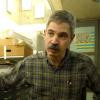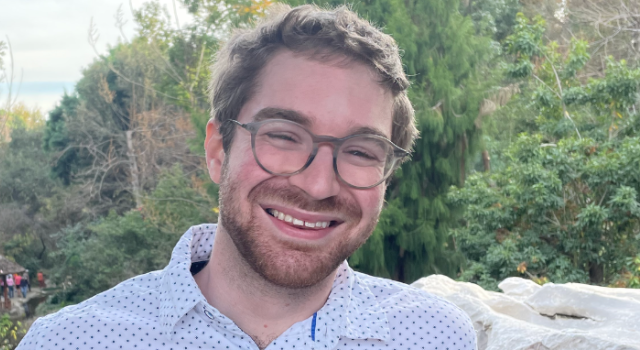
James Wald

James Wald holds a B.A. from the University of Wisconsin and an M.A. and Ph.D. from Princeton University.
His teaching and research interests include modern European history with an emphasis on cultural history from the 18th through the 20th centuries; the French Revolution; Central Europe; fascism and Nazism; and early modern Europe.
Particular research interests involve the history of intellectuals and literary life.
Personal Website
Recent and Upcoming Courses
-
Students and teachers spend most of their time reading and writing, but how often do we stop to think about what these acts entail, where they originated, how they have changed? Is the media revolution that we are experiencing one of degree or kind? Will the shift to electronic media mean not just the end of the book, but also the radical transformation of authorship and publishing, indeed, of the very ways that we read, research, and think? In order to situate ourselves in the present, we will turn to history, studying oral culture, the transition from manuscript to print in the Middle Ages, the rise of mass literacy in the modern era, and the rise of new media today. The comparison of past and present will enable students to understand their own situation, in the process introducing them to historical reasoning and research. Class may include occasional local field trips. Keywords:books, technology, history
-
"Everything has a history," the American Historical Association tells us. In order to understand why something is the way it is today, we need to understand how it began and how it got to be this way. This seems so obvious to historians that they are surprised to find not everyone thinks like this. Historical reasoning needs to be taught. We begin by looking at the ways that historians formulate questions, evaluate evidence, and draw conclusions. We then explore the many styles of historical writing. And the fact that something was not "always this way" means it can change. Understanding history is thus also essential to active citizenship. Finally, then, we consider major historical issues with a bearing on life today: experience of American Black and Jewish soldiers during World War II: fighting fascism abroad and discrimination at home and in the military. Keywords:US, World War II, African American, Jewish, History
-
Many people think of history as an authoritative account of the past, based on indisputable facts. Historians, however, understand it as an evolving interpretation: debate. They argue not just over the interpretation of facts, but even over what constitutes a fact. What happens in the age of "fake news" and "alternative facts"? What is the difference between debating why the Holocaust happened vs. claiming it never happened? Whether Vikings came to America vs. extraterrestrials built the pyramids? Did women have a Renaissance? How did French peasants understand identity? Were Nazi mass murderers motivated by hatred or peer pressure? Nazism discredited the idea of race, but genetics can help Blacks and Jews recover their lost histories. Are European Jews descended from medieval Turks or biblical Hebrews? Did Thomas Jefferson father a child with the enslaved Sally Hemings? Students will come to understand how historians work and thereby learn to think historically. Keywords: history
-
The "Shoah" (Hebrew: catastrophe, devastation) or "Holocaust"--the Nazi attempt to exterminate the Jews of Europe--has entered popular consciousness and the curriculum. Museums and monuments are commonplace. And yet, knowledge is neither widespread nor deep. In 2020, a majority of Americans aged 18-39 did not know how many Jews were killed; nearly half could not name a concentration camp. Although many people find religious, philosophical, or political meaning in the genocide, it in fact contains no intrinsic, much less, consoling message. Because this course is anchored in the discipline of history, it proceeds from the belief that the losses cannot be understood unless we examine the world that was lost. It addresses the roles of victims, perpetrators, and bystanders. It locates the Shoah in the spectrum of interethnic relations without portraying it as inevitable. It explains the uniqueness of the Jewish tragedy, while examining similar cases and universal implications. Keywords:history, European studies, German studies, Jewish studies
-
Hampshire College has always emphasized the value in students taking charge of their own education through "inquiry-based" learning, including independent projects. It has also emphasized the need for historical perspective in understanding our own world. As the ancient Roman author Cicero said, "To be ignorant of what occurred before you were born is to remain always a child." And the American Historical Association says: "everything has a history." History, the French scholar Marc Bloch, said, is thus not the study of the past, but the study of people "in time": an exploration of evolving humanity. The first part of the course will introduce students to both the broad sweep of European history and basic research methods. In the second part of the course, students will, in a carefully staged sequence, develop their own research questions, locate sources, and produce a final project. Keywords:history, research, project
-
For scholars, "history" means both historical events and the writing of history. In recent years, they have increasingly turned to the relationship between "history and memory": the way the past shapes the present and the present shapes our views of the past. The twentieth century witnessed the fall of empires and the birth of nation-states, wars of colossal destruction, and the struggle between dictatorship and democracy. How did people recall, interpret, and appropriate this turbulent past: create national identities? confront the contrast between technological progress and moral regression? mourn the millions of war dead? deal with loss of home? seek justice in the wake of Nazism and communism? Ideal for current or prospective history concentrators but open to all. Keywords:history, memory, World Wars, Holocaust, communism
-
Why study three countries about which you know little and may not be able to find on a map? In less than a century, Bohemia (now Czech Republic), Hungary, and Poland, which began as provinces of multiethnic empires, experienced independence, Nazi occupation, communist dictatorship, and independence again, as members of NATO and the European Union. These regions, with their dynamic population mixture of Germans, Slavs, Magyars, and Jews, embodied the tension between nationalism and cosmopolitanism, tolerance and intolerance, the persistence of tradition and the exuberance of modernity-issues relevant to many fields in the social sciences and humanities. We will explore the ways that culture shaped and expressed the history of East Central Europe, as well as the role of historical memory in the present. The course provides ideal preparation for our summer program in Prague and Krakow Keywords:Europe, culture, history, communism, nationalism
-
According to a famous and revealing anecdote, antisemitism means "hating the Jews more than necessary." Why hate them at all? Among the most perplexing things about antisemitism is its persistence. It has flourished for over two millennia in a wide variety of settings. Three-quarters of a century after the end of World War II, despite the rise of modern multiculturalism, it seems to be on the rise again. One-third of Jewish college students report having experienced antisemitism in the past year. It is no wonder that it has been called the longest hatred. What are its religious, psychological, or social roots? What were its effects? How did the Jews respond? The course moves from the ancient world, through the anti-Judaic teachings of the Christian churches, to the rise of modern social, political, and racial antisemitism of the nineteenth and twentieth centuries, and contemporary manifestations, on both right and left. Keywords:Judaism, Christianity, racism, Holocaust


